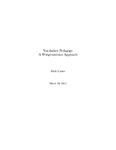Vocabulary Pedagogy: A Wittgensteinian Approach (thesis)

View/
Author
Comer, Emily G.
Subject
Washington and Lee University -- Honors in Philosophy
Vocabulary -- Study and teaching
Language acquisition -- Research
Semantics (Philosophy)
Wittgenstein, Ludwig, 1889-1951
Metadata
Show full item recordDescription
Thesis; [FULL-TEXT FREELY AVAILABLE ONLINE] Emily G. Comer is a member of the Class of 2014 of Washington and Lee University. My claim in this thesis is that we do not need to rely solely on studying dictionary definitions as the exclusive means of learning new words. Rather, there are far more powerful ways to increase students' vocabularies — including contextual examples, conversations about words, wide reading, and both dictionary and student-written definitions. To argue for this more holistic vocabulary pedagogy, I first consider the word-learning theory of prominent twentieth-century philosopher Ludwig Wittgenstein and draw several implications for vocabulary pedagogy from his work Philosophical Investigations. Then, using those implications as a framework, I examine several empirical studies that tested word knowledge and word learning. Next, I review Allen's well-regarded teacher resource book, Words, Words, Words, as an example of powerful, holistic vocabulary pedagogy. In accordance with the interdisciplinary nature of this thesis, I conclude with lessons for philosophy and lessons for education. [From Introduction] Emily G. Comer